Geothermal Power in Oregon: Difference between revisions
No edit summary |
No edit summary |
||
| (11 intermediate revisions by the same user not shown) | |||
| Line 3: | Line 3: | ||
[http://www.oregon.gov/ENERGY/RENEW/Geothermal/geo_index.shtml Geothermal comes from the Greek words meaning earth heat], explains the [http://www.oregon.gov/ENERGY/RENEW/index.shtml Oregon Department of Energy]. Oregon ranks [http://news.opb.org/article/geothermal-power-growing-despite-economic-chill/ 5th among states in the number of geothermal projects being developed], and has 9 geothermal projects in production. | [http://www.oregon.gov/ENERGY/RENEW/Geothermal/geo_index.shtml Geothermal comes from the Greek words meaning earth heat], explains the [http://www.oregon.gov/ENERGY/RENEW/index.shtml Oregon Department of Energy]. Oregon ranks [http://news.opb.org/article/geothermal-power-growing-despite-economic-chill/ 5th among states in the number of geothermal projects being developed], and has 9 geothermal projects in production. Geothermal can produce constant, sustainable, baseload power, 24/7. It is not intermittent like solar or wind. | ||
[[File:Geothermal.oregon.map.jpg|center|GreenPowerOregon Map of Renewable Energy Projects]] | [[File:Geothermal.oregon.map.jpg|center|GreenPowerOregon Map of Renewable Energy Projects]] | ||
[http://www.greenpoweroregon.com/green-power/renewable-energy-projects-map.aspx GreenPowerOregon.com] has a map of renewable energy projects in the state. | [http://www.greenpoweroregon.com/green-power/renewable-energy-projects-map.aspx GreenPowerOregon.com] has a map of renewable energy projects in the state (above). | ||
[http://www.greenpoweroregon.com/green-power/geothermal-power.aspx Geothermal power plants] make electricity by using wells to pipe underground steam and hot water to the surface, where it is converted into electricity. Geothermal energy is derived by harnessing the heat from the earth’s core. Magma typically remains below the earth’s crust, heating nearby rock and water to near 700 degrees F. | [http://www.greenpoweroregon.com/green-power/geothermal-power.aspx Geothermal power plants] make electricity by using wells to pipe underground steam and hot water to the surface, where it is converted into electricity. Geothermal energy is derived by harnessing the heat from the earth’s core. Magma typically remains below the earth’s crust, heating nearby rock and water to near 700 degrees F. | ||
[[File:Geothermal.png|center|429 px|AltaRock Geo Thermal]] | |||
[http://altarockenergy.com/ AltaRock Energy’s Newberry Volcano geothermal demonstration project] has [http://esd.lbl.gov/research/projects/induced_seismicity/egs/newberry.html hot rocks 10,000 feet underground]. But it doesn’t have water. So, [http://ecotrope.opb.org/2012/04/watch-newberry-geothermal-mini-quakes-online/ AltaRock is going to inject pressurized water underground], and break open natural fractures in the rock. The hot rock within the volcano will heat the water and create steam that can move a turbine and generate electricity. | |||
[[File:Calpinegeothermal1.jpg|center|AltaRock Geo Thermal]] | |||
[http://altarockenergy.com/ AltaRock Energy], with backing from Google, Khosla Ventures, Kleiner Perkins, and Paul Allen, says that [http://gigaom.com/2013/01/24/a-quiet-breakthrough-in-geothermal-power-tech it has reached a milestone at its demonstration site in Bend]. It has been able to create multiple, stimulated geothermal areas, from a single drilled well. This has never been done before, according to AltaRock, and it brings down the overall cost of enhanced geothermal by 50 percent. | |||
[http://www.blm.gov/or/districts/prineville/plans/newberry/index.php The Bureau of Land Management granted approval] for the [http://ecotrope.opb.org/2012/04/newberry-geothermal-project-gets-a-green-light/ geothermal energy demonstration project on the Newberry Volcano], 22 miles south of Bend. It will use a process called “[http://earthfix.opb.org/energy/article/is-geothermal-energy-coming-to-central-oregon/ hydroshearing]”, creating small earthquakes, most under a magnitude of 1, as pressurized water opens up natural fractures in the rock and and creates underground storage units. | |||
“In hydrofracking done in the oil and gas industry, they actually shatter the rock. They break the rock and create new cracks, new fractures in the rock. We just inject cold, clean groundwater,” said Will Osborn, [http://altarockenergy.com/ AltaRock’s project manager] at the Newberry EGS experiment. | |||
The project will test how much water will flow through hot rocks 10,000 feet under the volcano with the goal of using that water to create steam for electricity generation. However, the demonstration phase does not include a power plant. | |||
The U.S. Bureau of Land Management [http://www.energynow.com/energypanel/2012/01/18/altarock-energy-eyes-oregon-volcano-geothermal-resource released an environmental assessment of the project] paved the way to proceed with testing, which it does not expect to cause any serious environmental consequences. The Obama administration’s geothermal program hoped the earth’s bedrock could be quickly tapped as a clean and almost limitless energy source, [http://www.nytimes.com/2009/12/12/science/earth/12quake.html?_r=1&scp=2&sq=geothermal&st=cse but the earthquake hazard of AltaRock may be problematic], note the NY Times. | |||
More typically, geothermal is used by buildings to moderate temperatures. Pipes that go down a hundred feet or so can tap into a moderate 50 degree environment, year-round, and extract heat or coolant using heat exchangers. | More typically, geothermal is used by buildings to moderate temperatures. Pipes that go down a hundred feet or so can tap into a moderate 50 degree environment, year-round, and extract heat or coolant using heat exchangers. | ||
| Line 21: | Line 39: | ||
The city of Klamath Falls uses geothermal energy directly to supply heat for a district heating system. Geothermal heat sources in several other Oregon counties supply heat to buildings, swimming pools, resorts and industrial uses. | The city of Klamath Falls uses geothermal energy directly to supply heat for a district heating system. Geothermal heat sources in several other Oregon counties supply heat to buildings, swimming pools, resorts and industrial uses. | ||
[[File:Oregon.geothermal.map.jpg|center|550px|Oregon Geothermal Map from Oregon DOE]] | [[File:Oregon.geothermal.map.jpg|center|550px|Oregon Geothermal Map from Oregon DOE]] | ||
The [http://www.oregon.gov/ENERGY/RENEW/Geothermal/geo_index.shtml Oregon Department of Energy] has more information on [http://www.oregon.gov/ENERGY/RENEW/Geothermal/geo_index.shtml Geothermal resources in Oregon]. | The [http://www.oregon.gov/ENERGY/RENEW/Geothermal/geo_index.shtml Oregon Department of Energy] has more information on [http://www.oregon.gov/ENERGY/RENEW/Geothermal/geo_index.shtml Geothermal resources in Oregon]. | ||
Geothermal energy production could triple over the next few years [http://www.renewableenergyworld.com/rea/news/article/2011/03/u-s-geothermal-industry-expands-with-new-capital-government-support expanding from nine to 15 states], according to the [http://www.geo-energy.org/ Geothermal Energy Association]. The total installed capacity of the U.S. is approximately 3,102 MW, enough to power over 2 million homes. | [http://geology.com/usgs/geothermal-resources/ High heat flow is associated with the Earth's "hot spots"] (also called thermal plumes), whose origins are related to the upward flow of extremely hot mantle material from deep within the Earth. Geothermal energy production could triple over the next few years [http://www.renewableenergyworld.com/rea/news/article/2011/03/u-s-geothermal-industry-expands-with-new-capital-government-support expanding from nine to 15 states], according to the [http://www.geo-energy.org/ Geothermal Energy Association]. The total installed capacity of the U.S. is approximately 3,102 MW, enough to power over 2 million homes. | ||
<big>'''NEXT:</big> [[Green Buildings]]''' | <big>'''NEXT:</big> [[Green Buildings]]''' | ||
<big>'''Back to</big>: [[Green industry]] ''' << | <big>'''Back to</big>: [[Green industry]] ''' << | ||
Latest revision as of 13:24, 24 January 2013

<< Back to: Green industry <<
Geothermal comes from the Greek words meaning earth heat, explains the Oregon Department of Energy. Oregon ranks 5th among states in the number of geothermal projects being developed, and has 9 geothermal projects in production. Geothermal can produce constant, sustainable, baseload power, 24/7. It is not intermittent like solar or wind.
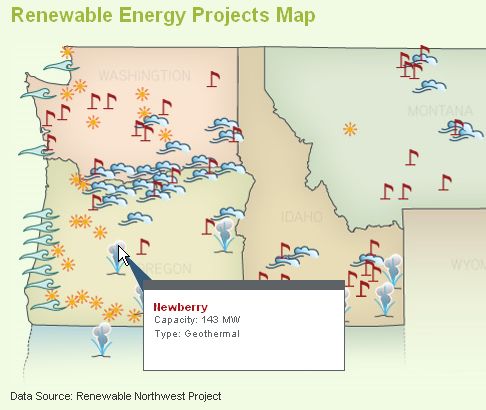
GreenPowerOregon.com has a map of renewable energy projects in the state (above).
Geothermal power plants make electricity by using wells to pipe underground steam and hot water to the surface, where it is converted into electricity. Geothermal energy is derived by harnessing the heat from the earth’s core. Magma typically remains below the earth’s crust, heating nearby rock and water to near 700 degrees F.
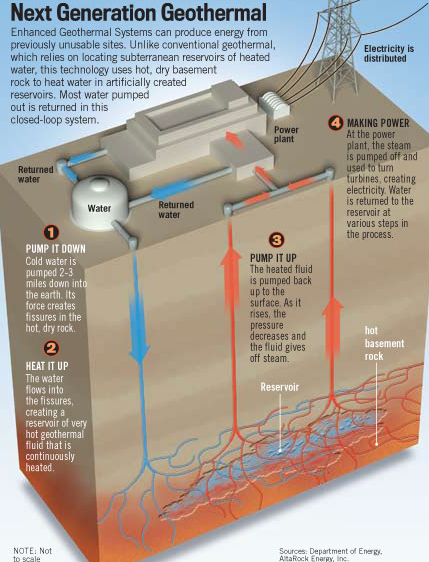
AltaRock Energy’s Newberry Volcano geothermal demonstration project has hot rocks 10,000 feet underground. But it doesn’t have water. So, AltaRock is going to inject pressurized water underground, and break open natural fractures in the rock. The hot rock within the volcano will heat the water and create steam that can move a turbine and generate electricity.
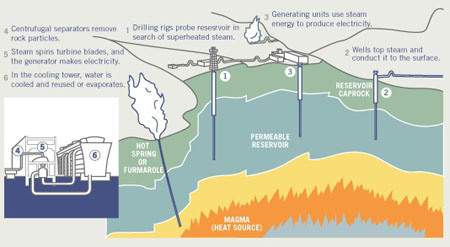
AltaRock Energy, with backing from Google, Khosla Ventures, Kleiner Perkins, and Paul Allen, says that it has reached a milestone at its demonstration site in Bend. It has been able to create multiple, stimulated geothermal areas, from a single drilled well. This has never been done before, according to AltaRock, and it brings down the overall cost of enhanced geothermal by 50 percent.
The Bureau of Land Management granted approval for the geothermal energy demonstration project on the Newberry Volcano, 22 miles south of Bend. It will use a process called “hydroshearing”, creating small earthquakes, most under a magnitude of 1, as pressurized water opens up natural fractures in the rock and and creates underground storage units.
“In hydrofracking done in the oil and gas industry, they actually shatter the rock. They break the rock and create new cracks, new fractures in the rock. We just inject cold, clean groundwater,” said Will Osborn, AltaRock’s project manager at the Newberry EGS experiment.
The project will test how much water will flow through hot rocks 10,000 feet under the volcano with the goal of using that water to create steam for electricity generation. However, the demonstration phase does not include a power plant.
The U.S. Bureau of Land Management released an environmental assessment of the project paved the way to proceed with testing, which it does not expect to cause any serious environmental consequences. The Obama administration’s geothermal program hoped the earth’s bedrock could be quickly tapped as a clean and almost limitless energy source, but the earthquake hazard of AltaRock may be problematic, note the NY Times.
More typically, geothermal is used by buildings to moderate temperatures. Pipes that go down a hundred feet or so can tap into a moderate 50 degree environment, year-round, and extract heat or coolant using heat exchangers.
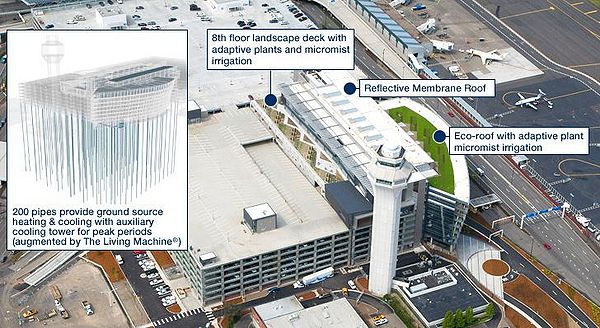
The Port of Portland headquarters is Gold certified and uses geothermal pipes to supplement heating (above)
There is no generation of electricity from geothermal sources within the state of Oregon. However, there are several sites where geological data suggest a resource sufficient for power generation may exist. The potential for production of electricity from Oregon´s geothermal resources has been explored at three sites in Oregon. The DOE in February finalized a $96.8 million loan guarantee to U.S. Geothermal to support their geothermal power project in Malheur County, Eastern Oregon.
The city of Klamath Falls uses geothermal energy directly to supply heat for a district heating system. Geothermal heat sources in several other Oregon counties supply heat to buildings, swimming pools, resorts and industrial uses.
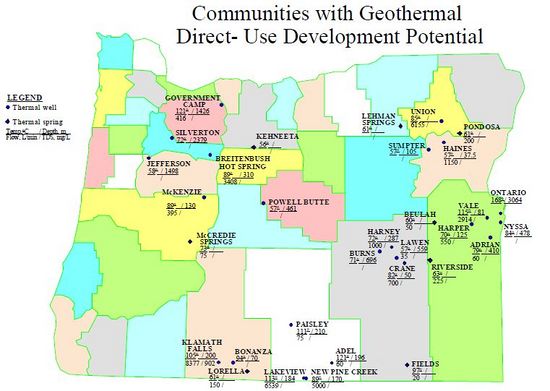
The Oregon Department of Energy has more information on Geothermal resources in Oregon.
High heat flow is associated with the Earth's "hot spots" (also called thermal plumes), whose origins are related to the upward flow of extremely hot mantle material from deep within the Earth. Geothermal energy production could triple over the next few years expanding from nine to 15 states, according to the Geothermal Energy Association. The total installed capacity of the U.S. is approximately 3,102 MW, enough to power over 2 million homes.
NEXT: Green Buildings
Back to: Green industry <<